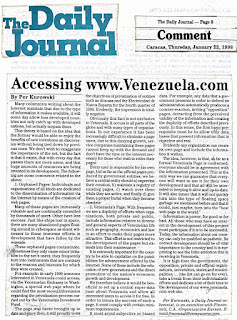Many columnists writing about the Internet maintain that due to the type of information it makes available, it will some day allow less developed countries not only catch up with developed nations, but actually surpass them. This theory is based on the idea that the former would be able to enjoy the benefits of new inventions and discoveries without being tied down by previous ones. We don’t wish to exaggerate the importance of the net, but the fact is that it exists, that with every day that passes there are more users, and that huge amounts of resources are being invested in its development. The following are some comments related to the above.
1. Orphaned Pages: Individuals and organizations of all kinds are dedicated to the dissemination of information via the Internet by means of the creation of web pages. Many of these pages are immensely valuable and are continually consulted by thousands of users. Other have less success. Just like ships lost in space, there are many abandoned pages floating around in cyberspace as silent witnesses to those immense efforts in development that have fallen by the wayside.
These orphaned pages contaminate. Sometimes they only cause minor irritation to the net’s users, they frequently turn into instruments that are contrary to the reasons and interests for which they were created. For example: in early 1996 someone interested in Venezuela could access, via the Venezuelan Embassy in Washington, a special web page where he could find the most recent information regarding the privatization process carried out by the Venezuelan Investment Fund. The page was never brought up to date and since then, it still proudly touts the objectives of privatization of entities such as Alucasa and the Electricidad de Nueva Esparta for the fourth quarter of 1996. Evidently, the impression is totally negative.
Obviously this fact is not exclusive to Venezuela. It occurs in all parts of the globe and with may types of organizations. In our experience it has been increasingly difficult to eliminate a page since, due to this dizzying growth, service companies maintaining these pages cannot keep up with the demand and don’t have the time or the interest necessary for those who wish to retire their pages.
Every user is responsible for his own page, but as far as the official pages produced by government entities, we believe a central entity should a) supervise their creation, b) maintain a registry of existing pages, c) watch over them while they are active, and finally d) give them a proper burial when they become obsolete.
2. Venezuela’s Page: With frequency we see a duplicity of efforts when organizations, both private and public, include information relative to diverse and general aspects of Venezuelan life such as geography, economics and law in an effort to make their pages more attractive. This effort is not restricted to the development of the pages but extends into their maintenance.
It is extremely important for the country to be able to capitalize on the possibilities for advancement offered by the Internet. Some of these include the education of new generations and the direct promotion of the nation’s economic growth and development. We therefore believe it would be beneficial to set up a central super-data base about Venezuela and allow all interested users to access it for free. In order to insure the success of such a page, it must comply with certain minimum requirements.
It must avoid subjective or biased data. For example, any data that a government presents in order to defend its administration automatically produces a counter-reaction, inviting “opposition” pages, detracting from the perceived validity of the information and creating the duplicity of efforts described previously. In this sense, the first basic prerequisite must be to allow only data bases that present information that is objective and real.
Evidently any organization can create its own page and include the information it wishes. The idea, however, is that, as far as a formal Venezuelan Page is concerned, everyone should be in agreement with the information presented. This is the only way we can guarantee that everyone will want to use it for their own development and that all will be interested in keeping it alive and up to date. It will also insure that it will not quickly turn into the type of floating space garbage we mentioned before and that it could, just maybe, turn into the “best web page in the world”.
Information is power, for good or for bad. All those who may have an interest in the development of this project must participate if it is to be successful. Today, the information about our country can only be qualified as pathetic. Its correct development should be of vital importance to the country and it is surprising to see the little attention this is receiving in Venezuela.
It is high time the government, the opposition, private and official organizations, universities, states and municipalities, ..... (the list can go on for ever), take a break from their individualistic efforts and dedicate a bit of their time to the development of our www.venezuela.com web site.






